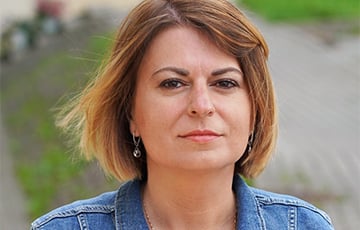Natallia Radzina: It's Necessary To Rescue Belarusian Political Prisoners
14- 14.11.2022, 16:11
- 17,628

We are responsible to act.
Vilnius hosted the World Liberty Congress on November 7-9. Vilnius hosted the World Liberty Congress on November 7-9.
Leader of the European Belarus civil campaign Andrei Sannikov, well-known journalist Iryna Khalip and editor-in-chief of the website Charter97.org Natallia Radzina represented Belarus at the event.
Natalia Radina told about the first World Liberty Congress:
— The event was organized by opposition leaders from Venezuela, Russia and Iran. Leopoldo Lopez, Garry Kasparov, Masi Alinejad organize it. Mainly human rights activists, former political prisoners and journalists attended the congress.
In my opinion, it's an extremely important event, because we were able to hear people who have gone through repression in their countries, who are fighting for human rights, trying to find effective methods to change the situation and fight dictatorships. I hope so much that this congress will proceed to the creation of a permanent organization, because, as this event has shown, the emergence of an international structure that will effectively resist the strengthening of dictatorial regimes in the world is very important.
Unfortunately, we observe that traditional international human rights organizations often turn into bureaucratic institutions and ineffectively defend people's rights. We see this even when discussing the definition of the status of political prisoners. It is extremely important here that the World Liberty Congress unites freedom fighters who have personal prison experience, really know what a dictatorship is and understand that it is fundamentally important to fight it.
— What issues did you manage to raise at the congress?
— It is very important that Andrei Sannikov and I were able to raise the topic of Belarusian political prisoners. Effective strategies for releasing people from prisons were discussed. We could exchange experiences, because some strategies were used in our country, some in other countries, and this was extremely useful.
The issue of Belarusian political prisoners, which we managed to raise, is, of course, one of the most sensitive. At the same time, it must be admitted that during the war unleashed by the regimes of Putin and Lukashenka against Ukraine, the issue of political prisoners in Belarus has been relegated to the background.
This is actually a huge problem, because there are from 4,000 to 5,000 prisoners of conscience in Belarusian prisons, and their conditions are really terrible. There are a lot of people with disabilities in prisons, people with severe chronic diseases and cancer sufferers. Considering the conditions under which they are being held, we can speak clearly about torture. There is a threat that some political prisoners simply will not leave prisons alive.
For example, Pavel Kuczynski recently celebrated his 28th birthday in prison. He has the fourth stage of cancer. It is clear that treatment is impossible in prison. It is important to note here that there is not a single hospital for prisoners in Belarus. We know that today this guy is “undergoing treatment” not even in the ward, but in the cell of the pre-trial detention centre of the Ministry of Internal Affairs on Valadarski Street in Minsk.
Palina Sharenda-Panasiuk, the activist of the European Belarus civil campaign, is being held in the most difficult conditions in a colony for recidivist women, and her fate was in the spotlight. She is constantly put either in a punishment cell or in a cell-type room. Well-known human rights activists from Turkey and Iran, Enes Kanter Freedom and Masi Alinejad spoke in support of Palina.
There was a discussion on the fate of the Nobel Prize winner Ales Bialiatski, who has been imprisoned for about two years, as well as the leader of the Belarusian opposition Mikalai Statkevich, who spent more than ten years in prison during the years of Lukashenka's rule and is now being held in the most difficult conditions in the Hlubokaje colony.
They spoke about the difficulty of the struggle of the Belarusians, whose relatives ended up in prisons. Belarus began to arrest the wives of prisoners of conscience. We also talked about the increased responsibility of diasporas for the fate of political prisoners. There is a need to hold daily actions of solidarity with prisoners of conscience, we need to turn to Western governments and demand from them real action to free people from prisons. We, the people who managed to leave Belarus, who are safe, are responsible to act. We can do a lot to save the lives of people in Belarus.
— Were the congress participants well aware of the situation in Belarus?
— Belarus was mentioned among, let's say, "leading" countries, where human rights violations are massive. We can state that here we are one of the "leaders" and the situation in Belarus is worse than in the countries of Central Asia or Latin America, whose representatives were present at the conference. Even Russia has a certainly difficult situation with prisoners, but there seems to be no such lawlessness as it is today in Belarus anywhere.
Of course, we must resist it, discuss it, shout about it, we must demand from the West to pay attention to this egregious situation with human rights in Belarus, to the situation with the actual murder of political prisoners in Belarusian prisons, to demand the introduction of tougher sanctions against the regime Lukashenka, because, unfortunately, we actually see that the topic of sanctions against Lukashenka's Belarus is also relegated to the background. These sanctions are not synchronized with the sanctions imposed against the Putin regime. This should be done. There are only talks so far, but we do not see real actions.
Therefore, it is necessary, firstly, to tighten these sanctions against the Lukashenka regime, demanding the immediate release of all political prisoners. Secondly, to monitor the implementation of these sanctions. And also impose secondary sanctions against countries that help the dictatorial regime bypass the imposed restrictions.












